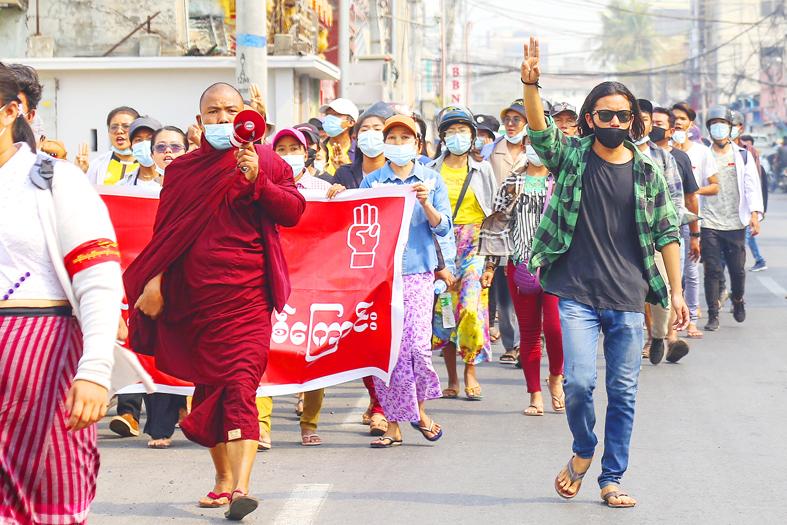Footwear maker Pou Chen Corp (寶成工業) yesterday said that it has suspended production at its plant in Myanmar amid clashes between police and protesters following a military coup on Feb. 1, in which the military deposed civilian leader Aung San Suu Kyi.
Pou Chen provides original design manufacturing services to international brands, such as Nike Inc, Adidas AG, Asics Corp, New Balance Athletic Shoe Inc, Timberland Co and Salomon SAS.
The company said that the decision to stop production was made out of safety considerations.

Photo: EPA-EFE/STR
The suspension is not expected to have an adverse effect on Pou Chen’s overall operations, as the Burmese plant accounts for a fraction of its total production, the company said.
Its factories in Bangladesh, Cambodia and Myanmar account for about 4 percent of the firm’s total production, Pou Chen said, adding that the closure of the Burmese manufacturing facility would not cause any delays in shipments to customers.
If greater capacity is needed to meet demand, production would be increased at its plants in Indonesia and Vietnam to fill the void left by the Burmese plant, the company said.
Pou Chen’s business has been affected by the COVID-19 pandemic, with revenue from its shoe contracting business falling 24.6 percent last year from a year earlier.
Tsang Yi Co (昌億), another Taiwanese footwear maker that supplies shoes to Adidas, has also halted its production in Myanmar amid the violence there, the Ministry of Economic Affairs’ Invest Taiwan office said.
Pou Chen and Tsang Yi suspended their Burmese operations to protect their employees, and it is unclear when production would resume given the turmoil in the country, the office said.

MULTIFACETED: A task force has analyzed possible scenarios and created responses to assist domestic industries in dealing with US tariffs, the economics minister said The Executive Yuan is tomorrow to announce countermeasures to US President Donald Trump’s planned reciprocal tariffs, although the details of the plan would not be made public until Monday next week, Minister of Economic Affairs J.W. Kuo (郭智輝) said yesterday. The Cabinet established an economic and trade task force in November last year to deal with US trade and tariff related issues, Kuo told reporters outside the legislature in Taipei. The task force has been analyzing and evaluating all kinds of scenarios to identify suitable responses and determine how best to assist domestic industries in managing the effects of Trump’s tariffs, he

TIGHT-LIPPED: UMC said it had no merger plans at the moment, after Nikkei Asia reported that the firm and GlobalFoundries were considering restarting merger talks United Microelectronics Corp (UMC, 聯電), the world’s No. 4 contract chipmaker, yesterday launched a new US$5 billion 12-inch chip factory in Singapore as part of its latest effort to diversify its manufacturing footprint amid growing geopolitical risks. The new factory, adjacent to UMC’s existing Singapore fab in the Pasir Res Wafer Fab Park, is scheduled to enter volume production next year, utilizing mature 22-nanometer and 28-nanometer process technologies, UMC said in a statement. The company plans to invest US$5 billion during the first phase of the new fab, which would have an installed capacity of 30,000 12-inch wafers per month, it said. The

Taiwan’s official purchasing managers’ index (PMI) last month rose 0.2 percentage points to 54.2, in a second consecutive month of expansion, thanks to front-loading demand intended to avoid potential US tariff hikes, the Chung-Hua Institution for Economic Research (CIER, 中華經濟研究院) said yesterday. While short-term demand appeared robust, uncertainties rose due to US President Donald Trump’s unpredictable trade policy, CIER president Lien Hsien-ming (連賢明) told a news conference in Taipei. Taiwan’s economy this year would be characterized by high-level fluctuations and the volatility would be wilder than most expect, Lien said Demand for electronics, particularly semiconductors, continues to benefit from US technology giants’ effort

‘SWASTICAR’: Tesla CEO Elon Musk’s close association with Donald Trump has prompted opponents to brand him a ‘Nazi’ and resulted in a dramatic drop in sales Demonstrators descended on Tesla Inc dealerships across the US, and in Europe and Canada on Saturday to protest company chief Elon Musk, who has amassed extraordinary power as a top adviser to US President Donald Trump. Waving signs with messages such as “Musk is stealing our money” and “Reclaim our country,” the protests largely took place peacefully following fiery episodes of vandalism on Tesla vehicles, dealerships and other facilities in recent weeks that US officials have denounced as terrorism. Hundreds rallied on Saturday outside the Tesla dealership in Manhattan. Some blasted Musk, the world’s richest man, while others demanded the shuttering of his